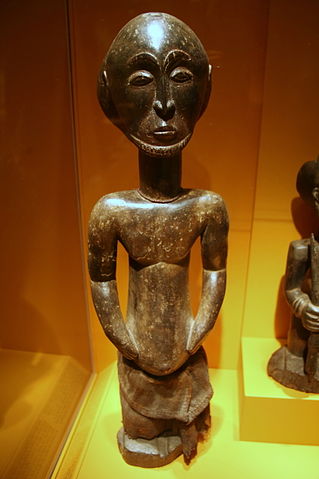 |
This is a file from the Wikimedia Commons. Information from its description page there is shown below.
Commons is a freely licensed media file repository. You can help.
|
| Description |
English: Male figure, Hemba peoples, Niembo chiefdom, Democratic Republic of the Congo, Late 19th to early 20th century, Wood, plant fibre, glass beadsAmong the Hemba peoples, carved wooden figures represent male ancestors who were venerated and linked to ownership of the land and to clan and lineage authority. They convey notions of ideal physical and moral qualities. Although these are said to depict particular ancestors, the figures are portrayed with generalized traits rather than individual, distinguishing characteristics. Both figures have well-balanced forms, refined and serene facial features and markers of gender, status and achievement. Each has an elaborate cruciform coiffure and a carefully rendered beard. One carries a warrior's lance and an adze and wears a narrow bracelet of authority. Both are meant to recall the political and military roles filled in the past by great men. (National Museum of African Art)
|
| Date |
21 September 2008 |
| Source |
Flickr |
| Author |
cliff1066 |

 |
This file is licensed under the Creative Commons Attribution 2.0 Generic license. |
|
|
|
- You are free:
- to share – to copy, distribute and transmit the work
- to remix – to adapt the work
- Under the following conditions:
- attribution – You must attribute the work in the manner specified by the author or licensor (but not in any way that suggests that they endorse you or your use of the work).
http://creativecommons.org/licenses/by/2.0 CC-BY-2.0 Creative Commons Attribution 2.0 truetrue
|
 |
This image, originally posted to Flickr, was reviewed on 23 October 2008 by the administrator or reviewer MBisanz, who confirmed that it was available on Flickr under the stated license on that date. |
File usage
The following pages on Schools Wikipedia link to this image (list may be incomplete):
This file contains additional information, probably added from the digital camera or scanner used to create or digitize it. If the file has been modified from its original state, some details may not fully reflect the modified file.
All five editions of Schools Wikipedia were compiled by SOS Children's Villages. SOS Children's Villages is an international children's charity, providing a good home and loving family to thousands of children who have lost their parents. We also work with communities to help vulnerable families stay together and raise children in the best possible environment. Why not try to learn more about child sponsorship?


